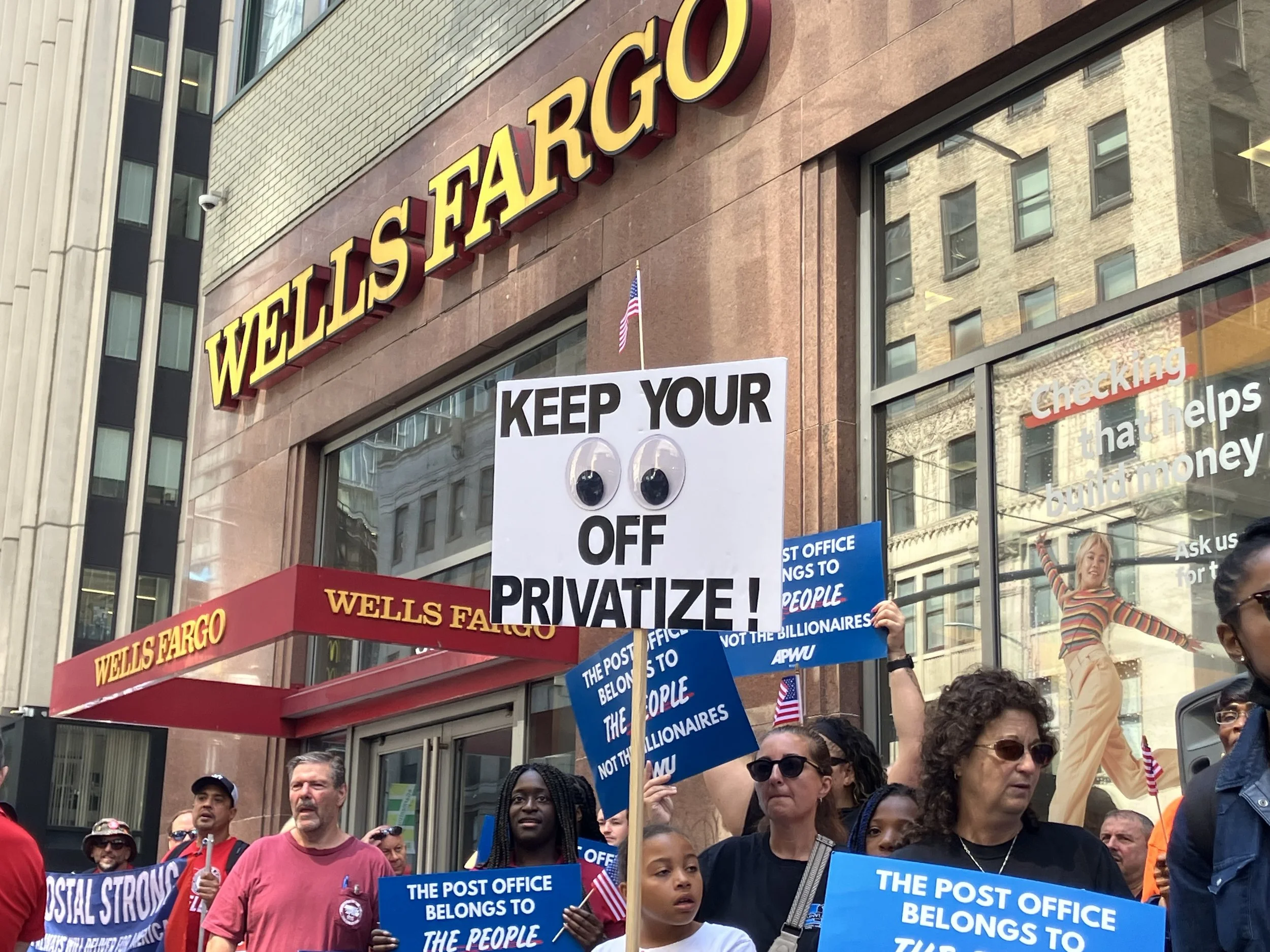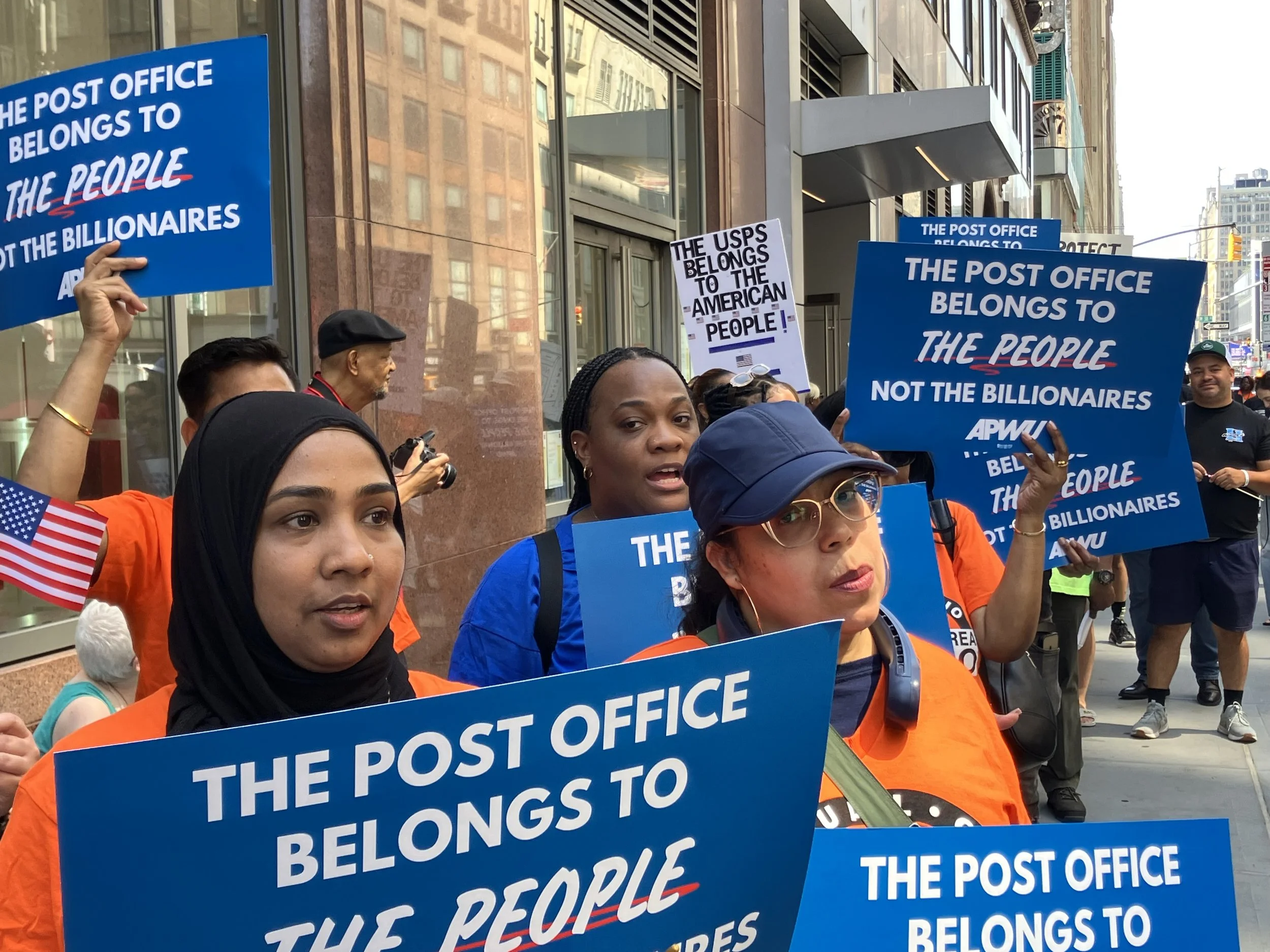‘The US Mail is Not For Sale’: Threat to USPS is Real Postal Workers Warn
Protesters outside the Wells Fargo branch at 535 7th Avenue in Manhattan rally against efforts to privatize the U.S. Postal Service. Photos/Joe Maniscalco
By Joe Maniscalco
Despite putting out an “Equity Research” paper earlier this year highlighting “The Required First Steps” to privatizing the U.S. Postal Service—multinational financial services giant Wells Fargo told Work-Bites this week it isn’t actually advocating selling off the U.S. Mail.
Postal worker unions and their allies, however, dismiss that as nothing but corporate “double-speak” and insist the threat is very real and immediate.
“The Wells Fargo report speaks for itself. It does advocate for privatization and closing of local post offices,” American Postal Workers Union [APWU] President Mark Dimondstein told Work-Bites in an email on Friday. “No amount of double-speak now by the bank’s spokespeople changes that. Wells Fargo said out loud what others only whisper.”
About 200 or more postal workers and their supporters rallied outside the Wells Fargo branch located at 535 7th Avenue in Manhattan on Thursday morning, July 24, to protest the privatization scheme they insist is clearly outlined in the Wells Fargo Equity Research document published this past February.
“They’re targeting the Post Office because they’re greedy,” NY Metro Area Postal Union President Jonathan Smith told Work-Bites on Thursday morning. “It’s class warfare—the haves versus the have-nots. It’s the rich versus the poor. They’re looking to take care of the rich. Look at the tax bill; the [One Big Beautiful Bill Act] was about giving millionaires and billionaires a tax break. That’s what this is about. This is about the working class which created this country in overalls fighting those who think they run this country wearing suits.”
In March, Jacobin’s Paul Prescod wrote about how right wing interests have spent decades drooling “at the thought of privatizing the United States Postal Service,” and noting how in December Donald Trump once again advanced the idea of moving the USPS under the Department of Commerce’s umbrella—with the help of Elon Musk’s Department of Government Efficiency [DOGE].
Unionized postal workers rally on 7th Avenue in Manhattan on Thursday against efforts underway to privatize the US Mail.
“Major financial institutions are giddy at the prospect,” Prescod wrote. “Last month, Wells Fargo released a memo outlining political pathways to achieve postal privatization and the various opportunities for profit. Their plan is clear: sell off the most profitable parts, raise prices, and decimate the unionized workforce.”
A Wells Fargo spokesperson responding to Work-Bites’ request for comment following Thursday’s rally said, "The research report we published did not recommend privatizing the us postal service."
The report instead, “analyzed the impact that potential privatization would have on FedEx, UPS, and the transportation shipping industry,” the spokesperson added. “Any suggestion that Wells Fargo has advocated for USPS privatization is misleading and inaccurate.”
Wells Fargo is widely-know for agreeing to cough up $3 billion as part of a deferred prosecution agreement with the U.S. Department of Justice back in 2020 after admitting to the DOJ it “collected millions of dollars in fees and interest to which the Company was not entitled, harmed the credit ratings of certain customers, and unlawfully misused customers’ sensitive personal information, including customers’ means of identification.”
“Their response doesn’t surprise me at all,” longtime labor organizer and activist Ray Rogers told Work-Bites after Thursday’s rally in Manhattan. “Wells Fargo is one of the most corrupt banking institutions in the world.”
Tenants rights activist Johnny Stevens calls for a united campaign against the forces of privatization.
Dimondstein told protesters, which also included members of the Communication Workers of America [CWA] embroiled in their own protracted contract fight with Wells Fargo, as well as customers and small business owners opposed to privatization from as far away as Iowa, that they were sending a message to the entire country—the “US Mail is not for sale.”
“This is truly a struggle between Wall Street and Main Street. It’s as simple as that,” Dimondstein said. “Wells Fargo is Wall Street. Wells Fargo wants to steal what belongs to the people of the country, and in their memo of February 27—they tell us that.”
Wells Fargo’s Equity Research paper to investors further states, “In order to stand alone and earn a reasonable return we estimate USPS would need to raise price by ~30-140% across its product lines,” while also stressing “value can be harvested” from USPS real estate.
Johnny Stevens, a tenant’s rights activist representing the Elliott-Chelsea and Fulton Houses in Manhattan where NYCHA is planning to hand over apartments to private developers and demolish all 17 residential buildings over the next 16 years, called Thursday’s Wells Fargo protest a “united struggle” against all privatization.
Retired stage manager and Manhattan resident Denise Yaney, meanwhile, told Work-Bites that it seems the forces of privatization are on the march now because “there’s just a few criminal, horrible voices that are in power.”
“We’ve just gotta take it back—and we can’t let little things slide because everything is just being picked away at,” she said.
The pathway to privatizing the U.S. Postal Service—according to the Wells Fargo Equity Research paper to investors—“starts with legislation.”
The United States Postal Service is outlined in Article 1, Section 8, Clause 7 of the United State Constitution. H. Res. 70, now pending in the House, seeks to further shield it from privatization.
“We believe any real change at USPS would need to start with legislation, effectively repealing the Postal Reorganization Act of 1970,” the documents’ authors say. “Bipartisan consensus seems unlikely, but there could be a path through reconciliation if included with the administration’s larger budget agenda. This could open the door to the USPS falling into the Department of Commerce headed by Howard Lutnick, who expressed interest in privatization.”
Trump tapped Lutnick—former Cantor Fitzgerald exec—to head the Department of Commerce last fall.
Dimondstein on Thursday further defended the U.S. Postal Service as a “wonderful national treasure.”
“Here we are at 250 years [old] and Wall Street wants to kill us,” told protesters on Thursday.
“And it’s not just Wall Street—it’s the billionaire sitting in the White House, heading the Chamber of Commerce, the people like Elon Musk rampaging through government services. They want to destroy what belongs to us so they can laugh all the way to the bank with more money,” he said.



